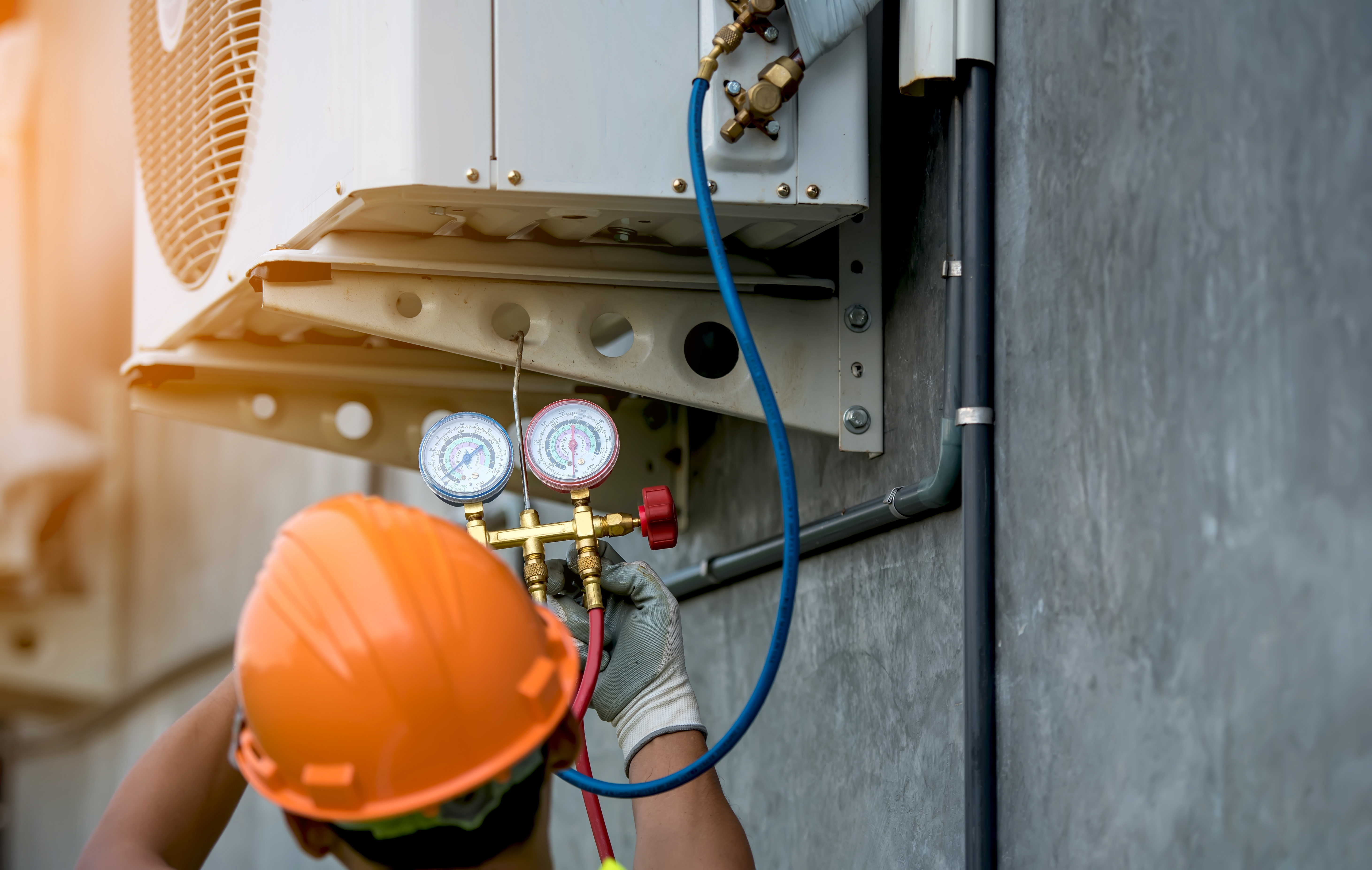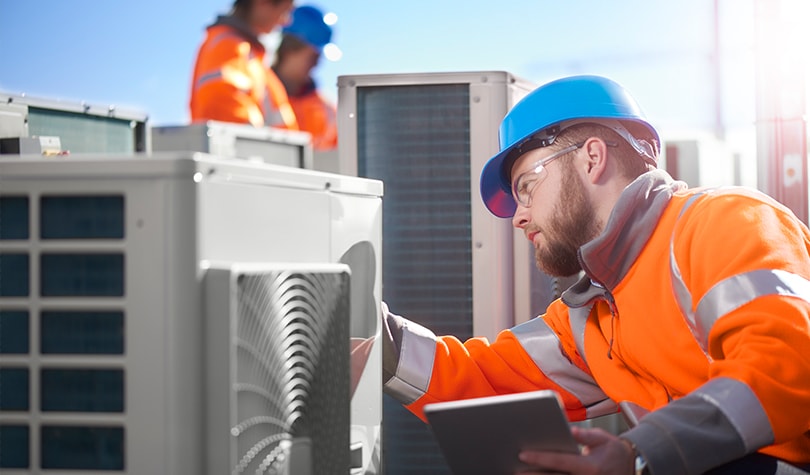HVAC contractor tips for spotting bad odors early
Wiki Article
Everything about A/c: Identifying Common Issues and Effective Air Conditioning Repair Work Approaches
Cooling and heating systems are critical for maintaining interior convenience. Understanding their components and functionality is vital for recognizing usual problems. Property owners usually encounter problems such as inadequate cooling, unusual smells, or rising power costs. These signs can show underlying problems that may need focus. Checking out do it yourself troubleshooting strategies can be useful, yet recognizing when to seek expert aid is just as crucial. What actions can be taken to guarantee resilient performance?Understanding Your Cooling And Heating System: Parts and Functionality
A heating and cooling system, often considered the foundation of indoor environment control, contains several vital elements that work together to manage temperature level and air top quality. The main components consist of the heating unit, ventilation system, and cooling unit. The heating unit, typically a furnace or boiler, produces heat throughout chillier months, while the a/c unit cools down interior areas during the summer season.
Typical Heating And Cooling Troubles House Owners Encounter
Homeowners commonly face several usual heating and cooling troubles, consisting of irregular temperature distribution throughout their home. In addition, unusual noises throughout procedure can indicate underlying problems that need interest. Attending to these worries quickly is essential for preserving optimal system performance.Irregular Temperature Circulation
Lots of households experience the frustrating concern of irregular temperature level circulation, where specific rooms really feel uncomfortably warm while others remain too cold. This trouble usually arises from a range of factors, including poor insulation, blocked vents, or an improperly sized cooling and heating system. When ducts are not properly secured or when furnishings obstructs air flow, some rooms may get insufficient cooling. In addition, thermostat placement can significantly affect temperature law; a thermostat situated in a sunlit location might misrepresent the general temperature level of your home. Regular maintenance, consisting of cleaning filters and making certain ductwork is clear, can help alleviate these inconsistencies. House owners may also consider zoning systems to better control temperatures throughout various areas of the home, advertising an extra comfy living setting.Unusual Sounds Throughout Procedure
When an a/c system operates, unusual sounds can suggest underlying problems that call for focus. Homeowners may come across a series of audios, such as grinding, squealing, or hissing. Grinding sounds frequently signal damaged bearings or parts, while squealing can recommend loosened belts or parts needing lubrication. Hissing may indicate a cooling agent leakage, which can jeopardize the system's efficiency. Additionally, banging audios could aim to loosened ductwork or an issue with the blower follower. Each of these sounds works as a warning, motivating home owners to check out even more. Ignoring these indicators can cause more substantial issues and costly repairs. Normal maintenance and prompt focus to unusual sounds can improve system durability and performance, guaranteeing a comfortable living environment.Indicators That Indicate Your Air Conditioner Needs Repair Service
Just how can one inform if their cooling unit needs fixing? Numerous indications may indicate underlying issues calling for specialist attention. If the A/c fails to cool down the room efficiently, it might recommend a refrigerant leakage or compressor breakdown. Furthermore, an increase in power costs without corresponding usage modifications might indicate ineffectiveness in the system. Home owners should likewise look out to unusual scents originating from the device, which could show mold and mildew growth or electric concerns. If the Air conditioning regularly cycles on and off, it might be a sign of a malfunctioning thermostat or other mechanical problems. The visibility of water pooling around the device can show a clogged drainpipe line. Recognizing these indications early can save money and time, guaranteeing that the cooling system operates efficiently and successfully.Do It Yourself Troubleshooting Techniques for Cooling And Heating Issues
When facing heating and cooling concerns, house owners can employ several do it yourself troubleshooting strategies to identify the issue. Key approaches include checking thermostat settings, examining air filters, and reviewing drainage concerns. These actions can assist pinpoint usual malfunctions prior to looking for expert assistance.Inspecting Thermostat Settings
What actions should homeowners take to ensure their thermostat settings are appropriate? They must verify the thermostat is established to the wanted temperature and mode, whether heating or cooling. Inspecting for a clear screen and verifying the thermostat is not established to "hold" or "vacation" mode is crucial. Homeowners need to also validate that the thermostat is level and installed in a location devoid of drafts, direct sunlight, or other temperature affects. Additionally, altering the thermostat can help offer precise readings. If the thermostat operates on batteries, changing them might deal with any issues. By methodically evaluating these variables, house owners can usually identify and correct thermostat-related problems, promoting ideal a/c system performance.Inspecting Air Filters
Air filters play a vital role in preserving suitable a/c performance. They catch dirt, irritants, and other fragments, making sure tidy air flow. Over time, filters can become clogged, decreasing air movement and efficiency. To check air filters, people must initially situate the filter, commonly located in the return duct or near the furnace. As soon as located, they should assess the filter's problem-- if it appears filthy or tarnished, it likely needs replacement. Many filters require altering every 1-3 months, relying on usage and ecological aspects. Routine examination and prompt replacement of air filters not just improve air high quality yet additionally lengthen the life-span of HVAC systems, avoiding potential Visit This Link breakdowns and costly repairs.
Evaluating Drain Issues
How can house owners effectively identify and deal with drain concerns within their a/c systems? First, they should check the condensate drain line for clogs or blockages, which can cause water buildup. Property owners may make use of a wet/dry vacuum cleaner to clear any kind of particles obstructing the line. Next, inspecting the drainpipe frying pan for rust or leaks is essential, as a damaged pan can trigger water to overflow. Regular cleansing of the drainpipe line with a mix of vinegar and water helps prevent future clogs. Additionally, making sure appropriate slope of the drainpipe line promotes effective water flow. If these do it yourself strategies do not settle the issue, getting in touch with a professional HVAC professional might be necessary to stay clear of prospective water damages and system failure.When to Call an Expert for AC Repairs

While some a/c problems can be handled via do it yourself furnace air conditioner methods, there are scenarios where calling a specialist becomes important. Home owners ought to seek expert support when they experience consistent problems, such as poor air conditioning, odd noises, or unusual smells emanating from the device. These signs might show much deeper issues that call for specialized expertise and devices to diagnose and fix appropriately.

Preventative Maintenance Tips for HVAC Durability
Regular preventative maintenance can substantially enhance the long life of HVAC systems. Home owners need to arrange yearly examinations by qualified technicians to analyze system effectiveness and recognize possible issues. Routinely changing or cleansing air filters is essential, as this assurances correct air movement and decreases pressure on the system. On top of that, checking and securing ductwork avoids energy loss and enhances overall efficiency.
It is additionally advisable to keep the exterior device clear of debris and greenery, enabling peak air movement and heat exchange. Property owners must evaluate the condensate drainpipe for blockages to stay clear of water damage and mold and mildew growth. Keeping suitable thermostat settings and using programmable options can improve power performance. Recording upkeep tasks helps track solution background and can aid in recognizing recurring problems. By adhering to these preventative actions, individuals can maximize the performance and lifespan of their a/c systems
Often Asked Inquiries
How Usually Should I Replace My Heating And Cooling System Filters?
Cooling and heating system filters ought to normally be replaced every one to three months, depending upon use, filter type, and ecological factors. Regular substitute assists maintain performance and air top quality, making sure peak system performance throughout the year.What Size HVAC System Do I Need for My Home?
To identify the appropriate cooling and heating system size for a home, one have to consider square video footage, insulation high quality, and neighborhood climate. Consulting an expert can help ensure optimal performance and convenience for the specific living space.Are There Eco-Friendly Heating And Cooling Options Available?
Yes, eco-friendly heating and cooling choices are offered, including energy-efficient heatpump, solar-powered systems, and geothermal heating. These choices minimize energy intake and environmental impact, promoting sustainability while keeping effective environment control for property and business spaces.Exactly How Can I Enhance My a/c System's Energy Efficiency?
To enhance HVAC power efficiency, one can frequently preserve the system, seal air leakages, set up programmable thermostats, make use of energy-efficient filters, and assurance sufficient insulation throughout the home to lower energy consumption and boost performance.
What Is the Average Lifespan of an A/c System?
The typical lifespan of an a/c system usually ranges from 15 to 25 years, depending upon elements such as upkeep, usage, and the quality of installment. Regular upkeep can significantly expand its functional longevity.Verdict
In summary, an extensive heating and cooling repair services understanding of heating and cooling systems empowers property owners to identify common problems and address minor problems properly. Acknowledging indications of malfunction, utilizing do it yourself repairing methods, and focusing on routine upkeep can enhance system performance and performance. When encountered with intricate repairs, employing expert aid is critical to assure safety and security and longevity. By fostering recognition and positive care, individuals can take pleasure in a comfy indoor atmosphere while decreasing unforeseen expenses connected with heating and cooling failures.Report this wiki page